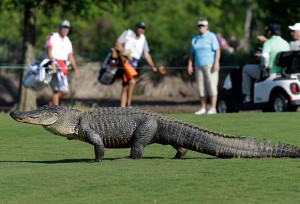The tragic news from Disney World in Orlando, Florida this week of a toddler being carried away and killed by an alligator in a lagoon on Disney property has sent waves of terror in every parent whose child has ever waded into any water other than a swimming pool. My family made many trips to Disney World when my children were young and water is everywhere around the property. It is my understanding that at this particular lagoon at The Grand Floridian Hotel there were “No Swimming” signs posted near the water. Yet the photos I have seen show chaise lounge chairs on a sandy beach in front of the lagoon. The beach was, apparently, man made by Disney for the enjoyment of their guests and Disney put the chaise lounge chairs on the beach looking directly to the lagoon. What is the message being sent by Disney? Come sit in these lounge chairs and enjoy the beach and the water? Doesn’t the placement of the chairs there and the placement of the sand there act as an invitation to wade in the water?
Disney is now, apparently, placing warning signs there now, along the lines of “Beware of Alligators.” Is this too little, too late? What is the duty Disney owed to its paying guests to warn them of alligators or to make sure they could not be harmed by alligators while their paying guests are staying at their hotels?
This incident brought to mind a similar tragedy that occurred not too long ago in Georgia, when a senior citizen was, ostensibly, grabbed by an alligator, carried away and killed while she was staying with her children at their home which was on a golf course. This case was litigated and, ultimately, decided by the Supreme Court of Georgia. The case is Landings Association v. Williams and was decided in 2012. The relevant facts, as discussed in the Court’s opinion are as follows: Williams, the victim, was house-sitting for her daughter and son-in-law at The Landings, a planned residential development with a golf course located on Skidaway Island off the Georgia coast. Before The Landings was developed, the land within and surrounding its boundaries was largely marsh, where indigenous alligators lived and thrived. In order to develop the property, The Landings entities installed a lagoon system which allowed enough drainage to create an area suitable for a residential development. After the project was completed in the 1970s, the indigenous alligators subsequently began to move in and out of The Landings through its lagoon systems.
Landings Ass’n, Inc. v. Williams, 291 Ga. 397, 397-98, 728 S.E.2d 577, 579 (2012). The landowner’s duty under Georgia law is based on the comparison of knowledge of the hazard on the property between that of the landowner and that of the victim. The Landings Association Court reiterated ‘[t]he true ground of liability is the proprietor’s superior knowledge of the perilous instrumentality and the danger therefrom to persons going upon the property. It is when the perilous instrumentality is known to the owner or occupant and not known to the person injured that a recovery is permitted.’ [Cits.] One who is familiar with the premises cannot rely for recovery upon the negligence of the defendant in failing to correct a patent defect where such party had equal means with the defendant of discovering it or equal knowledge of its existence.” The Supreme Court then held against the victim and in favor of the Landings Association (landowner) on the basis the victim knew there were wild, dangerous alligators indigenous to the property roaming around and knew that she may come face to face with one should she decide to take a walk on the property. The Court found the landowner did not have any superior knowledge of any potential hazard the alligators presented compared to the victim’s knowledge.
Robin Frazer Clark pursues justice for those who have personal injury claims as a result of being injured in motor vehicle wrecks, trucking wrecks, defective products, defective maintenance of roads, premises safety, medical malpractice and other incidents caused by the negligence of others. Ms. Clark is the 50th President of the State Bar of Georgia and a Past President of Georgia Trial Lawyers Association and has practiced law in Georgia for 28 years. Mrs. Clark is listed as one of the Top 50 Women Trial Lawyers in Georgia and is a Georgia Super Lawyer. Robin Frazer Clark~Dedicated to the Constitution’s Promise of Justice for All.
 Atlanta Injury Lawyer Blog
Atlanta Injury Lawyer Blog













